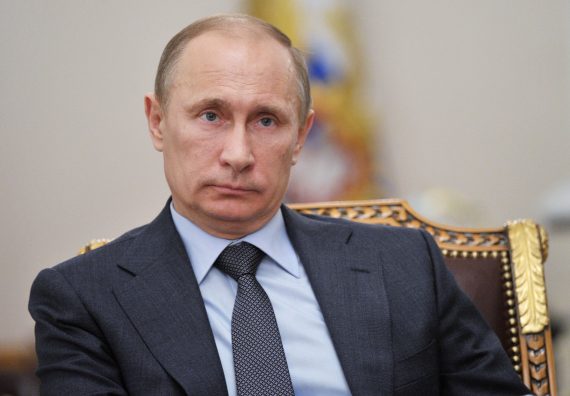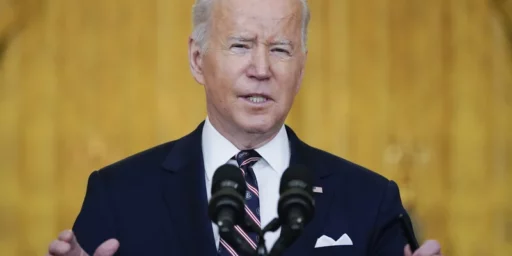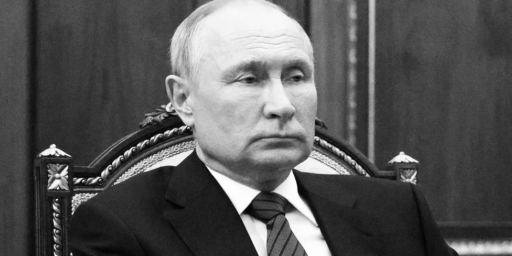Vladimir Putin Decrees That Russian Military Deaths Are Now A State Secret
If a Russian solider dies, it's now a secret thanks to a new decree signed by the Russian President.
Vladmir Putin has decreed that deaths or injuries suffered by Russian soldiers constitutes secret information that can be withheld from the public:
MOSCOW — The deaths or wounds of Russian soldiers in “special operations” can be classified as military secrets, even in peacetime, President Vladimir V. Putin decreed Thursday. The decree comes as Russiafaces accusations that it is sending its soldiers clandestinely to fight inUkraine, an allegation the Kremlin denies.
Mr. Putin’s decree amended a law that had let the military keep soldiers’ deaths or injuries secret only in times of war.
Mr. Putin has repeatedly insisted that Russian soldiers are not taking part in the conflict in eastern Ukraine, where government forces and pro-Russian separatists keep fighting despite a cease-fire deal in February.
At home, Russia’s political opposition says that by refusing to acknowledge that its soldiers are in combat in Ukraine, the Russian military is unjustly denying them disability payments and denying their relatives death benefits and other awards.
All the while, there are widespread indications of a rising casualty toll for Russian soldiers, including wounded ones showing up at hospitals, new graves appearing in cemeteries and testimony from relatives of the dead.
Mr. Putin’s press secretary, Dmitry S. Peskov, said Thursday that the amendment was “not tied to Ukraine,” but was just a routine “improvement in the law in the area of state secrets.”
Yet Mr. Putin’s decree could empower the police to arrest journalists or human rights activists who gather information about soldiers’ deaths, according to Ivan Y. Pavlov, a human rights lawyer. He called it a tacit acknowledgment of covert action by the Russian military.
“It was done so Ukrainian issues will be secured against unwanted attention,” Mr. Pavlov said in a telephone interview.
The decree, published Thursday on a government website, came after members of the political opposition issued a report saying that at least 220 serving Russian soldiers had died in Ukraine since last spring. That report includes details gathered by the opposition leader Boris Y. Nemtsov, who was killed on a Moscow street in February.
Witnesses have described secret nighttime burials illuminated by truck headlights. Relatives of dead soldiers have told journalists about confusion over whether their loved ones died in training accidents in southern Russia or in combat in Ukraine.
Caught between a desire to honor its soldiers and a need to maintain secrecy in an earlier phase of the Ukraine conflict, the annexation of Crimea, the Kremlin has wavered. At first, it denied any Russian military role in Crimea, where soldiers in ski masks and uniforms with no insignia mysteriously appeared in March 2014 and helped expel the Ukrainian government from the peninsula. Later, the Kremlin acknowledged that the soldiers were Russian troops and even created a holiday in their honor.
When the conflict moved east the next month to Donetsk and Luhansk, two primarily Russian-speaking regions of Ukraine near the Russian border, Russian officials once again denied any involvement, but those denials have evoked broad skepticism.
Although not acknowledged in the approved Russian press, the issue of the fate of Russian soldiers fighting in a war that the Kremlin has never officially acknowledged has apparently been one that has been brewing in Russia for the better part of the past year. Reports have surfaced of Russians protesting in various parts of the country when the military refused to provide them with information about what happened to their family members, and the fact that Putin’s government has always denied that there are any Russian troops at all in eastern Ukraine has caused them to cover these matters up more than they might otherwise have done. Admittedly of course, the Russian military has never been as open about what happens to its soldiers as the United States and other nations have generally been, so to some degree this is just par for the course. Added into that is the fact that acknowledging that Russian soldiers have died or been injured in Ukraine would mean acknowledging something that the Kremlin has consistently denied, and it’s easy to see how they came to make this choice. In the end, these soldiers are completely expendable to Putin and, while he would no doubt use their deaths to stir up nationalist fervor if he thought that would help him, for the moment denials and secrecy are far more important so that’s the course he’s chosen.
Another factor that is likely influencing Putin’s decision to keep casualties secret here is the legacy of Afghanistan. Even in the Soviet era, that Kremlin was unable to keep the truth about what was happening in that war from spreading among the populace. Men who served there would come home and tell their stories, family members would tell their neighbors about the son, father, or brother, they lost in the war. While the Soviets never saw any real anti-war protests, it was clear by the mid-80s that domestic support for the war in Afghanistan was virtually non-existent no matter how much propaganda the Kremlin pumped out. If the military adventure in Ukraine started going negative for Russia, one could imagine Putin and the military leadership fearing that publicizing the deaths of soldiers would end up undermining public support for the war. Better to keep the bad news secret than risk it causing problems at home, right?
The interesting question, of course, will be just how effective this measure will be in keeping the truth from the Russian public. Even with the controls that the Putin regime has over the media, information flows much more freely there today than it did in the Soviet era, and even then the government couldn’t always keep things secret for very long. If things go badly for Russia,







@Doug Mataconis:
And that’s what happens when someone writes about Russian military deaths…
a) Let’s hope Doug didn’t find himself on the wrong end of a polonium-tipped umbrella,
and
b) Information is “freer,” sure, but I was under the impression that the official state news had done a good job framing any story vaguely anti-Russian as Western propaganda. Besides, the annexation of Ukraine kindles a nationalist fervor from what I’ve heard; some lying from your government to keep the West from calling you “the bad guys” is probably an acceptable trade-off,
and
c) Is it just me, or doesn’t this resemble why Ed Harris took over Alcatraz that one time, forcing us to send Sean Connery and Nic Cage in to take him out?
http://thoughtcatalog.com/jacob-geers/2015/02/9-super-awkward-times-republicans-gushed-about-how-great-vladimir-putin-is/
Maybe the GOP should push to amend Art. II Sec. 1 of Our Great Charter to get rid of that pesky natural born Citizen, clause so Vlad can give Ricky Dink, The Huckster and Dandy Randy Paul et. al. a run for their Rubles!
How about the American pow’s from the Vietnam War who were sent to Russia ? What about those people, Mr. Putin.?
Somehow I don’t think this will work the way Vlad thinks it will….
@grumpy realist:
It will probably work just fine. I’ve never gotten the impression that Russians were great seekers after truth.
As is the case with most tyrants, the longer they hold power the more they seem to unravel. As the years of his reign stretch on Putin appears to growing more paranoid, vicious and greedy for yet more power.
Curious how his reign will come to an end.
Clearly the US would never do something like this!
CIA Memorial Wall
Oh, drat.
@michael reynolds:
It’s safe to say, from my experience, that Russians are on the cynical end of the “cynicism vs. idealism” scale of… well, just about everything, politics included.
Nothing wrong with that(granted, I’m on the cynical end too), it’s just a different mindset from that of many Westerners.